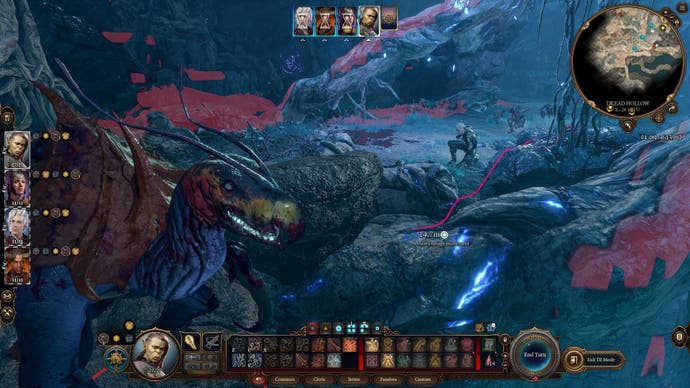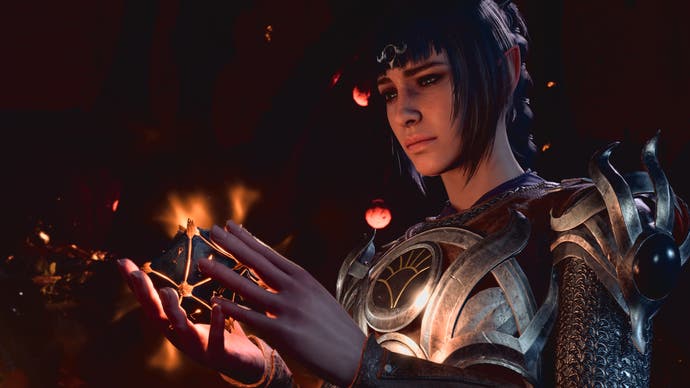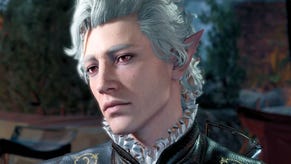Baldur's Gate 3 review - a critical success, with critical failures
Front-loaded dice.
Baldur's Gate 3's initial story hook is simple: you have a mindflayer parasite in your brain, and you probably don't want that (unless...?). Its gameplay hook is much more ephemeral though: the promise of not just adapting the Dungeons & Dragons system, as plenty of games have done before, but taking that wide improvisational space of playing at the table into the more rigidly coded world of a video game.
It's an ambitious idea, particularly in the CRPG space, where there's a general trend that very close adaptations of tabletop rulesets tend to feel hostile to their players - we rely on human moderation to fudge dice rolls, adapt encounters, and respond to their players, and a straight adaptation running on cold hard random numbers alone can feel like the person (computer) running the game is being cruel. But, at least for the first 30 hours, as it responds to the choices you've made through character creation, dialogue, and even tiny interactions with its world, developer Larian seems to pull off the unlikely, and make an RPG that feels truly collaborative.
This breadth of possibility in Baldur's Gate 3 is really an illusion - but one that's closer to excellent stagecraft than a distracting wizard spell, and it's meticulously done. The magician Larian pulls a rabbit out of its hat, and instead of looking up the developer's sleeve you think about casting Speak with Animals, or doing an animal handling check to try and pet it, or maybe seeing if it has unique responses to a wildshaped druid.
 12 Awesome Baldur's Gate 3 Beginners Tips and Tactics - How to get the Best Start in Baldur's Gate 3
12 Awesome Baldur's Gate 3 Beginners Tips and Tactics - How to get the Best Start in Baldur's Gate 3
The trick, of course, is that when you're surrounded by animals in a grove full of druids you feel invited to drink that elixir, or cast that spell, and spend that resource - and in turn, the animals in that grove full of druids all have fascinating things to say. You can still put the same effort into talking to animals in a dark dungeon with scurrying rats - but the rats have much less to say, and it isn't as inviting as spending your resources on the unique challenges of the dungeon ahead. It isn't limitless, but an exchange - much like how a good Dungeon Master at the table will craft encounters that play to your strengths and weaknesses, Baldur's Gate 3 knows when you're likely to have certain abilities, how to let you show them off, and when to take them away.
This is to say that Baldur's Gate 3 isn't an immersive sandbox where you can do or say anything that your imagination can let you, even if it wants you to feel that way. Instead, it's a series of artfully staged scenarios and encounters, where the magic works best when you play along with what the scene puts in front of you - letting the environment or characters invite you to say 'yes and'. Staggered cliffs invite you to climb or fly up them; conspicuous barrels of wine make you check if your wizard has fireball prepped, or your rogue a flammable arrow, while a room full of paper and books suggests quite the opposite. You can always engage with its systems how you like - there's nothing stopping you trying to solve every problem by carrying boxes around to climb on - but you feel most seen by the game when you see it first.
.jpg?width=690&quality=75&format=jpg&auto=webp)
.jpg?width=690&quality=75&format=jpg&auto=webp)
So Baldur's Gate 3, a video game, can't be your DM at the table - but one of the ways it feels like it's collaborating with you as a player and storyteller is that it lets go of a lot of the video game-y conceits that make the player feel more passive. If you hear a man cry out from a burning building, and you take a rest to recover your resources, he won't still be there for you to rescue once you've packed up your camp. Reading books about lore doesn't populate your dialogue options with politely tagged correct answers - you just know more, as the player. Valuable plot information can be held in notes and books vulnerable to your area of effect attacks. And, most of the time, quests and combat feel full of potential ways to respond.
When there's so much more variety than a strictly stealth/speech/combat route, these choices become about roleplay. I could only play one character for this review, but I've played several over Early Access, because the different approaches are so rewarding. In a village overtaken by goblins, my noble-yet-blunt paladin walked straight up to the gates and demanded a surrender. My power hungry sorcerer also walked straight up to the gates, but mind-controlled the goblins into accepting her authority. On the other hand, my good-but-not-kind rogue successfully jumped over a broken wall, with the intention of sneaking through, but got tangled up in a gnome rescue.
.jpg?width=690&quality=75&format=jpg&auto=webp)
You'll have to accept the thumbnail versions of these character descriptions - their lengthy backstory headcanons are between me and a highly trusted Discord server - but even from character creation alone it's hard not to feel deeply motivated. When even the tiniest environmental action feels like a roleplay choice (does sneaking past something objectionable mean implicitly allowing it?), the capital-C Choices feel even more weighty, getting to them knowing exactly who this character is, and how they would feel.
Its turn-based combat feels similarly responsive. Every fight has a reason, and a way to read the stage for the best advantage - spotting high up places to hide your archers, clusters of enemies to disable before they can scatter, isolated casters to pick off in advance - before the tide shifts and you have to adapt to the situation at hand. An especially triumphant (and unplanned) moment for me was when I was fighting a particularly powerful enemy in a dungeon, drained of resources, and she stopped and bargained with me. When I refused the deal, she turned invisible and fled, and I felt briefly helpless that I didn't have anyone who could cast See Invisibility, and that she would escape. I panicked, tossed a bomb in roughly the last spot I'd seen her - and it worked.

It's the kind of thing I would suggest at the table, but I wouldn't necessarily expect a game to 'know' - and so the roll of the dice, from everything else about that dungeon that left me low on health and poorly equipped, came down to this incredibly rewarding, incredibly tense gamble of a moment. It wouldn't have felt nearly the same if it was a simple question of win or lose, or a battle that would need to be reset, because the encounter doesn't end there, it unfolds into a new narrative. The story moves on with a narrowly avoided tragedy - something much more memorable than a narrowly avoided game over.
Most of my praise for Baldur's Gate 3 belongs to its first act, which contains all its promise. It is vast, covering mountainous groves, foetid swamps, underground temples and psychedelic mushroom settlements, all of which are intentionally crafted at every moment. There's a wonderful social element to being able to ask friends if they've gone down the well, or lament about accidentally exploding a mushroom cave, and have these be as immediately recognisable as any scripted battle encounter - and also hear how wildly differently they can go. It's a section I've played over and over, rolling different characters to make previously unthinkable choices, not in the pursuit of 'more content', but because I wanted to envisage a character who could be that person. I likely still will again. It feels perfectly seamless: the magic act is in full flow.
As the first elements of its mystery unfolds (why aren't we all turning into mindflayers?) the companions you pick up along the way have varying opinions about what you should do next. For the militant githyanki Lae'zel, the mystery doesn't matter: if it doesn't happen now, it will surely happen later. For the vampire Astarion enjoying the unexpected benefit of walking in the sun for the first time in centuries, maybe this could be exploited?
.png?width=690&quality=75&format=jpg&auto=webp)
.png?width=690&quality=75&format=jpg&auto=webp)
They're an odd bunch, the kind that only a mindflayer parasite could bring together, and individually I love what they contribute to the story. More than just their plot ties, their complicated histories and wants and needs - which aren't always the same thing - are worth the time and care to unpick, and the voice performance of the cast carries it to an emotional level that left me at times tearfully patting the top of my monitor.
I'm not the only one with strong feelings about the characters though, after two years of public response and feedback to Early Access companions. Where fan demand has seen NPCs like Halsin promoted to bear-shaped romance option, I'm left wondering if even more alterations have been made in the service of, well, fanservice. Astarion and Shadowheart, both antagonistic and secretive, have long provoked an 'I can fix them' response - and suddenly it feels like the antagonism is dialled down, and displays of vulnerability dialled way up, in ways that don't quite mesh.
.jpg?width=690&quality=75&format=jpg&auto=webp)
Whether there was a change in direction or this was always the end goal, the moments where characters' story arcs feel specifically fannish - separate to romantic - seem to rob them of an arc that makes sense, both within themselves and as part of the larger plot. Traits and motivations - as well as facts about the world - are retconned between acts, and the impetus for change seems to only be the player's own force of personality. Like the overt way companions express desire for you once they hit the required approval threshold and have to explicitly be rejected, it feels like smarter, more interesting choices were compromised to satisfy specific fantasies - not to mention that the discomfort in feeling like you've walked into the middle of a fantasy intended for someone else.
It's an odd position when other parts of the game do feel comfortable being oppositional to the player. It is easy to kill plot important NPCs, or miss or destroy important information, or make terrible choices by accident. Act two specifically can branch in considerably dark ways through player failure or inaction - and it all happens at a rate to give you whiplash. It's an abrupt and intense change to the pacing, as plot reveals and personal revelations stack up, and it feels stark in comparison to the exploration-led nature of the first act. And while this tonally tracks, it also made me feel like I broke something when I reached a potential point of no return extremely early on, and spent the rest of my time awkwardly zigzagging around the map.
.jpg?width=690&quality=75&format=jpg&auto=webp)
It's dense, erratic, and unfortunately where the magic act begins to unravel. The game becomes difficult to 'read' - the possibilities confusing, rather than inspiring - and the adaptivity it thrives on begins to break, as dead NPCs pop up in cutscenes, characters share knowledge they shouldn't have, and companions persistently forget whether or not we're in a relationship. More seriously, at the climax of the second act I encountered the game-breaking bug where my save files corrupted because they were too large - in fact, this bug was fixed with hotfix 2.1 because we brought it to Larian's attention. The understanding is it was incredibly rare, but it's a problem which still required waiting several days to be identified and patched before I could continue at all.
While I didn't experience corrupted saves again, technical issues broadly worsened as I entered the city of Baldur's Gate itself. Bugs ranged from visual glitches to experiencing a soft-lock in the final fight when the game failed to end one character's turn. Near every part of the game was affected, from technical performance through to gameplay and narrative. Notably, I had to turn the difficulty down as conditional abilities in combat only triggered inconsistently. This particularly affected my build for Astarion, as core aspects of his build - creating advantage and landing critical hits in order to perform high damage sneak attacks - were all unreliable.
.jpg?width=690&quality=75&format=jpg&auto=webp)
Quest flags also continued to break, leading to one companion never returning to camp after needing space during their quest, and baffling conversations with another companion who seemed to have Schrodinger's Chat, delivering dialogue for contradictory outcomes in the same conversation. And while bugs like these do get fixed, act three feels much less responsive to the choices you make within it.
This is one of the biggest drawbacks of the late game - that act one exchange of invitation and 'yes and' goes away in favour of something much more directed. When the main quest knocked at my door and said, 'hello, this is urgent', I believed it - thinking back to all the characters I'd unwittingly killed through ill-timed naps. But when I pursued that thread directly, I ended up at a dead end because I wasn't supposed to be in that area - yet. I was supposed to have found it via a different quest. Unlike in Baldur's Gate 3's intuitive act one, I wasn't supposed to follow those clues, they were just there to build tension.
.jpg?width=690&quality=75&format=jpg&auto=webp)
.jpg?width=690&quality=75&format=jpg&auto=webp)
This happens repeatedly in act three, where my attempts to pick up what I feel like the game is putting down are met with a firm rebuff. You can't sneak around this enemy, you can't disguise yourself when people are looking for you, you can't heal this NPC scripted to die mid-dialogue - and he doesn't have anything to say if you cast Speak With Dead, either. In another game, I wouldn't expect this kind of responsiveness, but it's a dramatic shift in a game that had, up until then, been crafting a dedicated space for exactly that. What you're left with are set-pieces and boss fights that are - by themselves - still artful pieces of encounter design, but ones that feel detached from the campaign and a sense of meaningful roleplay.
At its best, Baldur's Gate 3 achieves its quest to be Tabletop Roleplaying: The Video Game, with a to-and-fro of distinctive scenes that invite you to pay attention to them, and reward you generously for responding thoughtfully. I was often surprised, delighted, and shocked by its plot reveals, and emotionally torn about which direction - from a roleplaying perspective - I should pursue. At its worst, however, it's buggy to the point of broken - despite several post-launch hotfixes, with more to come - and frequently feels like its best aspects are compromised. Baldur's Gate 3 only has such a capacity to disappoint because for so long it feels like it does the impossible, making a game that feels actively collaborative as a storyteller - but it does, in the end, both critically succeed and critically fail.









